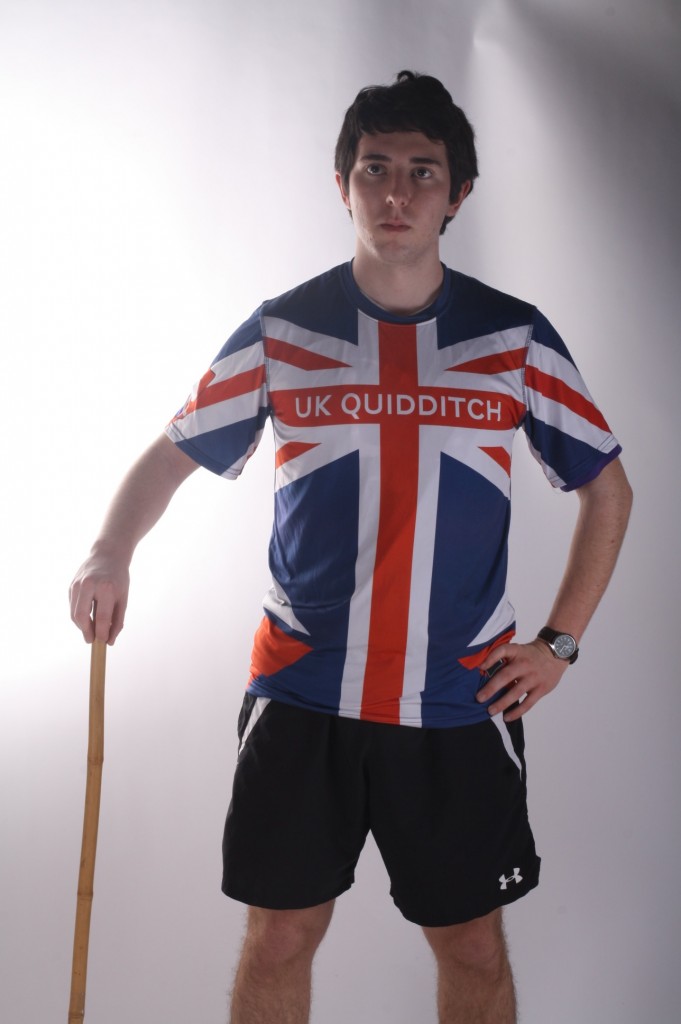Beaters throw bludgers, keepers guard their set of hoops on either edge of the oval field and chasers fly across the field fighting for possession of the quaffle. Seekers chase down the valuable golden snitch, hoping to end the game once and for all with the triumph of capture.
If you thought this described the fantastical sport of Quidditch devised by J.K. Rowling in the best-selling Harry Potter series, you would only be half right.
Yes, Quidditch is a sport composed of two teams of seven people, six hoops, six balls and brooms. But, no, it is no longer an impossible game confined only to the inhabitants of the wizarding world.
According to the International Quidditch Association (IQA), Quidditch was first adapted as a real-life sport in 2005 by Xander Manshel, a student at Middlebury College in Vermont. The game quickly became popular among college students who played it as an intramural for two years before an unofficial college Quidditch league was created in 2007 by Alex Benepe, the founder of the IQA. Today, more than 300 universities and high schools actively compete in Quidditch and the game is played in 12 different countries.
Additionally, an official Quidditch World Cup is held each year with the top 80 teams from around the world competing for the championship title. The sixth World Cup will be held in Kissimmee, Florida, April 13-14, 2013.
According to Tom Kirk, senior and Quidditch player, while Quidditch still revolves around a love of Harry Potter, it has also grown into a more authentic sport.
“[Quidditch] is definitely a serious thing, especially when you get to the World Cup,” Kirk said. “Most people are there to have fun playing a game that they love, but a large number of people don’t have anything to do with Harry Potter. They just play the game because it’s challenging and fun.”
In addition, Kirk agrees with the IQA when they say Quidditch is increasing in popularity.
“In terms of other sports people basically make up on the spot and decide to start playing, [Quidditch] is more popular than anything that’s come out recently,” Kirk said. “It’s really crazy because of how fast it’s grown.”
Kirk, an avid Harry Potter fan, discovered Quidditch when he stumbled upon a video of people playing the sport on YouTube a year and a half ago. He quickly became interested and began searching for a way to get involved.
After talking to fellow Harry Potter Club members and his teacher, Jenny Willenborg, in his Honors Biology class during his junior year, Kirk became more intrigued by the sport. He first played the sport with Webster University, one of the few schools in the area who has a team, after talking to them through their Quidditch Facebook page.
“I told them I was trying to start a team at Kirkwood,” Kirk said. “I got to play with them, and from that point I was like, ‘I need to figure out how to bring this to Kirkwood and set up a game or something.”
Kirk then introduced the sport to the Harry Potter club, “Dumbledore’s Army,” where they finally played Quidditch. Maddie Varble, sophomore and club member, said she heard of playing Quidditch before but never tried until Kirk set up a game.
“Harry Potter, in general, got me interested, but Tom’s definitely the one who is most into it,” Varble said. “I like [Quidditch] because it’s kind of a sport of all sports. It combines a bunch of different sports into one, so that’s kind of fun.”
Since then, Kirk has continued to play Quidditch, and hopes to carry on the sport wherever he goes to college. While Quidditch is not a factor in Kirk’s decision, he said it is always a perk if the school has a Quidditch team.
“Most of the colleges I’m looking at have nerds who are awesome enough to have a Quidditch team already,” Kirk said. “They aren’t as well know as Middlebury, but they are still there having fun, running around with brooms between their legs remembering Harry Potter.”
As for the logistics of the game, Kirk said a slightly deflated volleyball acts as the quaffle (the ball used to score points) and a red dodgeball is used as the bludger which is thrown at chasers to get them “out.”
“It’s a lot more athletic than people think,” Kirk said. “It’s a really tough sport once you try to carry a ball while running as fast as you can with a broom between your legs.”
In addition to chasers and beaters, one person dresses up in yellow and hangs a tennis ball covered in a sock from the back of their pants each game. This person, the snitch, is usually a cross country runner and tries to avoid capture by the seekers in any way they can. Once the seekers snag the tennis ball, the game is over. Kirk said he prefers being the snitch when he plays Quidditch.
Another stipulation to the game is that all players, besides the snitch, must carry a broom-like object at all times. While the official Quidditch rules do not require the object to be an actual broom (a plastic pipe or stick work too), Kirk said he wishes for all players to use a real broom.
“[The rule] is a turnoff for some people,” Kirk said. “But I’m never really happy about calling something Quidditch if you’re not running with a broom between your legs.”
Although Kirk said he prefers Quidditch to be played seriously when it comes to real competitions, he personally plays the sport for enjoyment.
“I just play to show people what Quidditch is like and try to have as much fun as I can in a short period of time,” Kirk said. “It’s normally running around dressed in yellow while people chase me.”
Ultimately, what Kirk appreciates most is the connection he is able to keep through playing a sport that comes from his favorite series of books. According to Kirk, it is the small details and rules that make the game similar to Harry Potter.
“The game carries the same magic that’s in Harry Potter. It’s like I’m flying around on a broom,” Kirk said. “You can watch movies, and talk about the books, and read the books a dozen times, but this is something that you can actually do. And it’s fun and you can do it with a whole bunch of people. Quidditch is a really fun way to celebrate and remember Harry Potter.”











